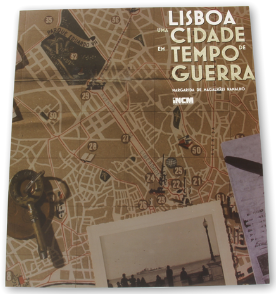 Margarida de Magalhães Ramalho, author of the recently released “Lisboa, Uma Cidade em Tempo de Guerra (Lisbon, a city in times of war) delves into Portugal’s capital city during World War II.
Margarida de Magalhães Ramalho, author of the recently released “Lisboa, Uma Cidade em Tempo de Guerra (Lisbon, a city in times of war) delves into Portugal’s capital city during World War II.
Portugal’s neutrality made its capital, Lisbon, the gateway to freedom out of a predominantly Nazi-occupied Europe. Here, Jewish exiles, anti-Nazis and Gestapo Agents all rubbed elbows in the city of light that defied the wartime blackouts that were common in the rest of Europe.
We will now visit some intriguing places in Lisbon that had their role in not letting any foreign power take over the city.
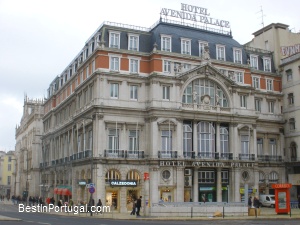 Hotel Avenida Palace
Hotel Avenida Palace
This five-star hotel , located in the Baixa (downtown Lisbon), was a pro-German hotel that had a backdoor with access to the Rossio docks that allowed the access to people who didn’t want to be seen. There is where the double agent Nathalie Sergueiew , codename Solange for the Germans and Treasure for the English, stayed. English Government codebreakers that monitored her wireless traffic praised her work.
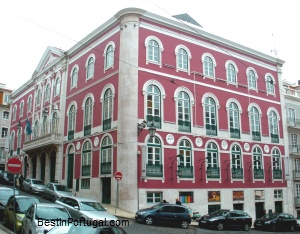 Teatro da Trindade
Teatro da Trindade
This concert hall served as a stage in 1941 to the American-born French dancer,singer and actress, Josephine Baker who worked for the French Resistance as an honorable correspondent. As an entertainer, Baker had an excuse to move around Europe and she came twice to Lisbon, bringing in the lining of her mink coat and also in her bra instructions to agents in Lisbon, and leaving with photos and microfilms. It was said that the sheet music of the concerts she gave at the theater had writings in invisible ink containing information about the position of the Nazi troops in France, that Baker then copied to small pieces of paper placed inside books that where collected by English secret agents.
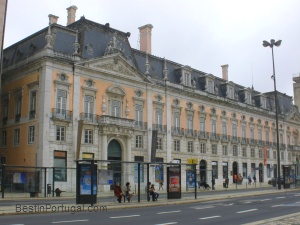 Palácio da Foz
Palácio da Foz
Initially named Palácio Castelo Melhor, it was the headquarters of the secretariat of national advertising of the writer, journalist and politician António Ferro and also served as the newspaper office of the “Anglo Portuguese News” which was founded and directed by Luis Marques, considered by the German as Winston Churchill’s spokesman in Lisbon. According to Margarida de Magalhães Ramalho, Luis Marques and his wife, Susan Lowndes, played an important role in supporting refugees during the war. They also worked for the Allies, providing an extensive list of the news clippings of the Axis powers, which were published in Portugal since it was a neutral country. The Palace today houses the Institute of Social Communication (Instituto da Comunicação Social).
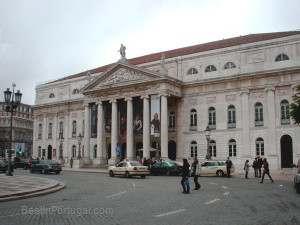 Teatro Nacional Dona Maria II
Teatro Nacional Dona Maria II
It was in this theater that the british actor Leslie Howard , who was eternalized as Ashley Wilkes in the film “Gone with the Wind”, gave a conference on the modern interpretation of Shakespeare, in 1943. According to the author, the arrival of the actor in Portugal, invited by the British Council, was the work of Allied Propaganda. Upon his return to the UK that same year, his airliner was shot down by German forces over the Bay of Biscay, which led to his death.
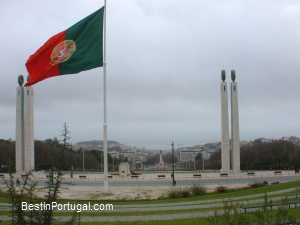 Parque Eduardo VII
Parque Eduardo VII
The Estufa Fria, or cold greenhouse, was built in 1930 in the aforementioned park in one of the most sought after places by the refugees of the World War II during their forced stay in Lisbon. After 1943, at the top of the Parque Eduardo VII (given that name in 1903 in honor of King Edward VII of England , that had visited Lisbon the year before, to strengthen ties between both countries), anti-aircraft batteries were placed. Also, in the parcel of land close to the former Pavilhão dos Desportos, or sports pavilion, is where balloon barrages were assembled and placed in the skies of Lisbon for the protection of the city in case of air attacks. The Estufa Fria continues to be today one of the prominent green spaces of the capital, with great scientific and botanical value.
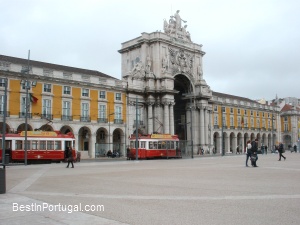 Praça do Comércio
Praça do Comércio
An important meeting point in Lisbon, the square was also a place of pilgrimage for hundreds of refugees who showed up daily at the Post Office to try to obtain information on lost relatives or to receive phone calls from the other side of the Atlantic. Some bomb shelters were created here for the protection of the population. The arcades, protected with sandbags, were patrolled by men of the Portuguese Legion, recalls Margarida de Magalhães Ramalho.
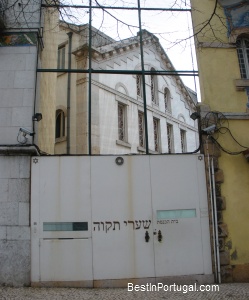 The Lisbon Synagogue
The Lisbon Synagogue
Called Shaaré Tikvah (Gates of Hope), it was projected by Miguel Ventura Terra, a prominent Architect of urban development in Lisbon at the turn of the XIX-XX century. The Synagogue was one of the most sought after places by Jews during the war, serving as an important support of the newly arrived. This was the destination of all those who came to Lisbon for news of lost relatives, spiritual support and practical information, the historian affirms.
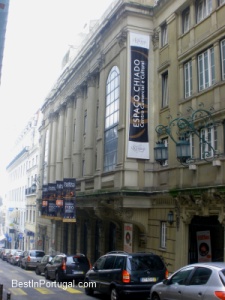 Teatro do Ginásio
Teatro do Ginásio
(Theatro do Gymnasio, according to the pre-1911 orthographic agreement)
This Theatre was opened in 1845, and staged the earliest representations of revue performance in the end of the XIX century. In 1941, the space was rented to the Germans for their propaganda sessions, which left the director of censorship services, Alvaro Salvação Barreto, with a problem in his hands. “The director could not control what the Germans exhibited and worst still, he didn’t know how to hold back the English of following the example” explains the writer. Today the building houses the Cultural and Commercial Center Espaço Chiado.
*Article by Nelson Marques (Journalist of the Expresso Newspaper) . Article was originally published in the Revista magazine supplement (pages 68/70) of the Expresso, dated October 12, 2012 and translated under permission by BestInPortugal.
Image credits: www.incm.pt for the book cover and BestInPortugal.com for all the other images.
For purchase information on the book, visit Imprensa Nacional Casa da Moeda

{ 7 comments… read them below or add one }
I lived in an empty ruined house in a little picturesque town north of Lisbon.It’s name was Asenjos du mar(I don’t remember good) in fall of 1995.The ceiling of the room I slept in was covered with newspapers of the time of the war.They informed about London bombing by Germans.I didn’t speak portugese,but understood main words,dates,and of course pictures with zeppelines above the city.So there must have lived someone else before me as homeless half a century earlier.The house was already a ruin.What a magic time,living in the house,what a magic country.
Thanks for your comment, Jack! In perusing through
50-year old newspapers of the WW2 era in a runned down house, you must have experienced mystery together with uneasiness for what that period represented (even in a neutral country like Portugal). Would the town that you lived in be Azenhas do Mar, close to Sintra, in the greater Lisbon area?
Yes.It was the town.And one characteristic feature was a big swimming pool with the ocean water exchanging endlessly.Merry Christmas and happy New Year.
Thanks, Jack. Greetings of the Season and Best Wishes for the New Year.
Fascinating…thank you!
I met Susan Lowndes and Luiz Marques in the summer of 1972 when I visited Portugal. I spent that fall in Monte Estoril, where they lived, and they invited me to write and help edit their paper The Anglo-Portuguese News. Every afternoon I went to their home, worked, joined them for tea, and often read the classics aloud to Luiz, who was very bent-over, but entirely lucid and humorous. Susan and Luiz adopted me into their little family. They were stellar people, whose history I never knew until reading this. Can anyone tell me how to contact their children? I know they had a son living at the time in Lisbon, but I forget his name. I would very much like to make contact with their children.
Anne Crosman, author, journalist, teacher
Sedona, AZ
annecrosma@aol.com
I enjoyed your comment, Anne! I cannot give you guarantees but I’ll try to find their contact and let you know about it. Thanks.
Hi Anne.I got the contact that you were looking for and sent you a PM. Have a great day.
{ 1 trackback }